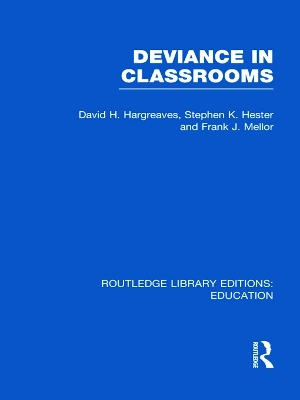Routledge Library Editions: Education
3 total works
Deviance in Classrooms (RLE Edu M)
by David H Hargreaves, Stephen Hester, and Frank J Mellor
When originally published this book reported the first major application of ‘labelling theory’ to deviance in classrooms. The authors explore the nature of classroom rules, show how they constitute a pervasive feature of the classroom, and examine the ways in which teachers use these rules as grounds for imputing ‘deviance’ to pupils. A theory of social typing is developed to show how teachers come to define certain pupils as deviant persons such as ‘troublemakers’ and several case-studies are used to document this analysis. Finally, the teachers’ reactions to disruptive classroom conduct are examined as complex strategic attempts at social control in the classroom. The book has a double focus on deviance theory and the process of teaching.
Disaffection from School (Rle Edu M)
by David H Hargreaves, Professor Stephen Hester, and Frank J Mellor
Disaffection From School
by David H Hargreaves, Stephen Hester, and Frank J Mellor
A large number of pupils are, or are liable to become, disaffected with their schooling. In this comprehensive account of the problem, Ken Reid suggests that school can and should do much more to prevent and overcome disaffected behaviour, as manifested by such factors as absenteeism, disruption and underachievement. The book covers disruptive behaviour in its broader context and examines the search for an explanation within schools themselves. Formal and multidisciplinary approaches to the problem are also fully treated. The author has drawn on his considerable school and research experience and the book is well illustrated with examples and case histories.
Ken Reid argues that questions about attitudes and approaches in teaching and in pastoral care provoke a continued challenge, and stresses that if such questions are not faced squarely the long-germ prognosis for secondary education in Britain may be bleak. Teachers in training and all those involved in the education and welfare of difficult or disadvantaged children, especially teachers, heads and social workers, will find Disaffection from School both challenging in its analysis and helpful in its suggestions.

